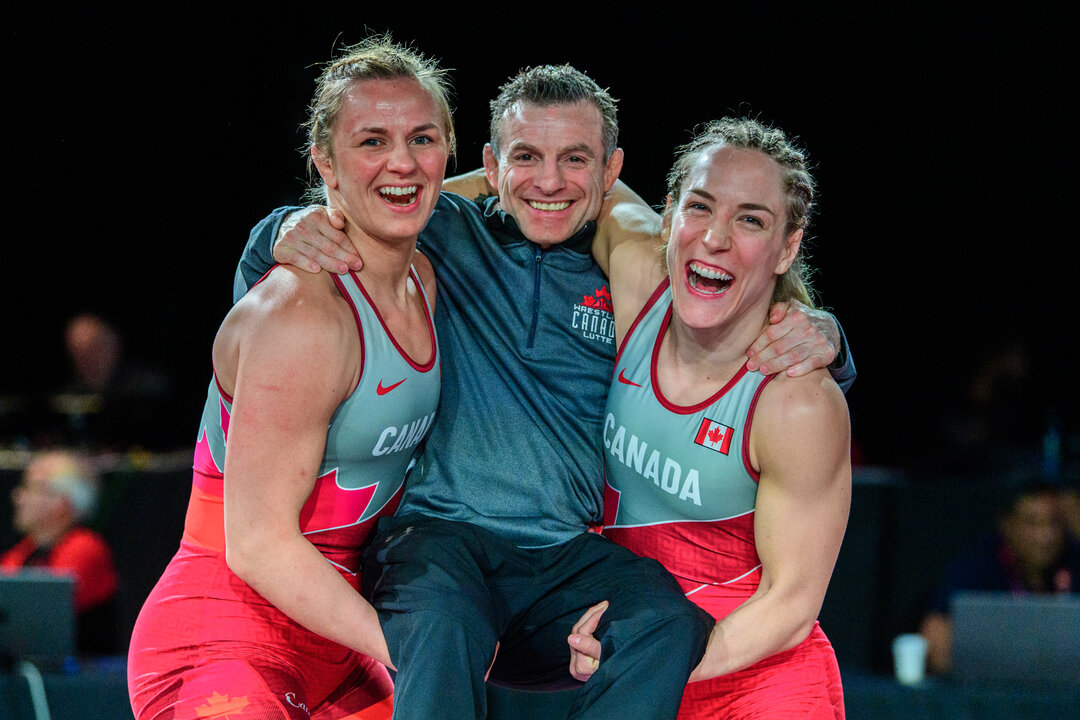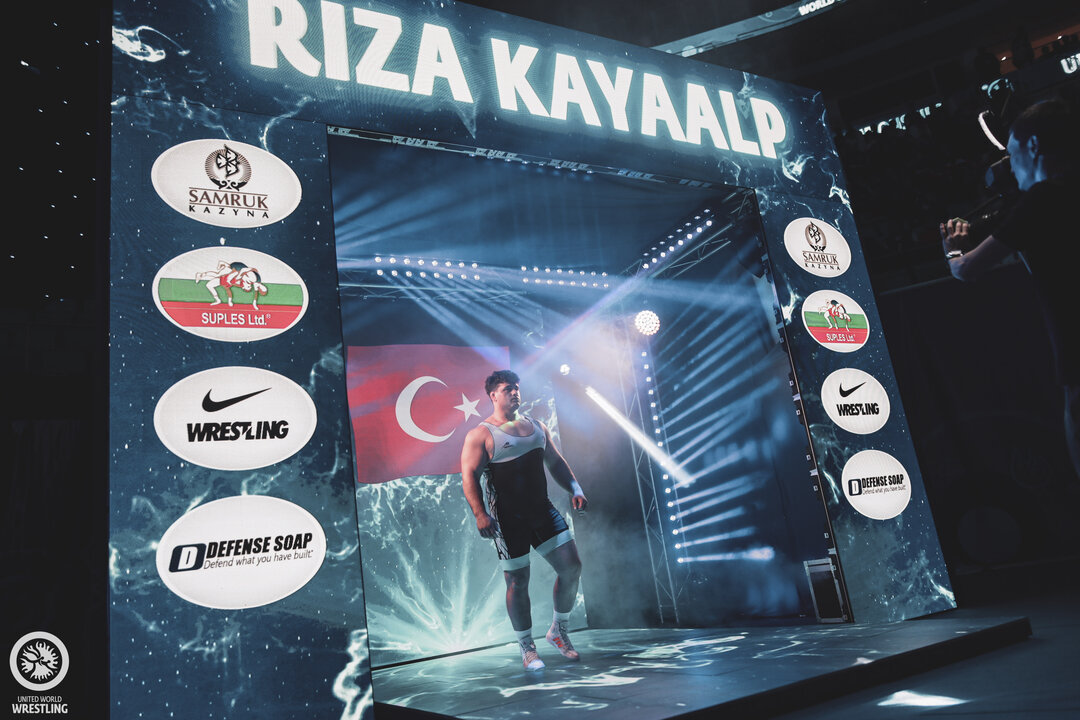VUNG TAU, Vietnam (June 13) -- The U17 Asian Championships will be held in Vung Tau, Vietnam from June 23 to 27.
The tournament will be held after the U23 Asian Championships at the same venue. For U23 Asian Championships entries, click here.
For full schedule of U23 and U17 Asian Championships, click here. All the matches will be live on uww.org and the UWW App.
Note: Entries are subject to change 72 hours before the draw of each style. Refer to UWW Arena for the draw.
U17 Asian Championships
45kg
Jiarui ZHANG (CHN)
SHIVAM (IND)
Benyamin ASHOFTEH (IRI)
Jumpei FURUYA (JPN)
Sabyrzhan RAKHATOV (KAZ)
Arnur NURSAIDOV (KGZ)
Anartulga BEKHBAT (MGL)
Hesuka WICKRAMAARACHCHIGE (SRI)
Isgender HUDAYBERDIYEV (TKM)
Mirjalol MUKAMMILOV (UZB)
Dinh Long NGUYEN (VIE)
48kg
Shu YUAN (CHN)
MAHSUN (IND)
Sina BOUSTANI KALATEH (IRI)
Tsubasa YAMAYA (JPN)
Temirlan MURAT (KAZ)
Dovudbek BAKHADIROV (KGZ)
Dagvadorj JARGALSAIKHAN (MGL)
Kadambu APPUHAMILAGE (SRI)
Kemal CHARYYEV (TKM)
Shakhobidin NURMANOV (UZB)
51kg
Ziqin WEI (CHN)
Dhanraj JAMNIK (IND)
Sina ORDOU (IRI)
Omar MUSLEH (JOR)
Yuki MAEDA (JPN)
Kemel KAZHTAY (KAZ)
Sadyr KAIYPBEKOV (KGZ)
Yijun HONG (KOR)
Anar ODBAYAR (MGL)
Ashan WICKRAMA PATHIRANAGE (SRI)
Thanwarak KAEWTHIPMONTREE (THA)
Muhammetaly PARAHADOV (TKM)
Ulugbek RASHIDOV (UZB)
55kg
Sarwar SARWARI (AFG)
Wenlong LI (CHN)
NISHANT (IND)
Reza BARARI (IRI)
Yamato FURUSAWA (JPN)
Ibrahim YSKAKBEK (KAZ)
Zhakshylyk BOROBAEV (KGZ)
Hoisik JEONG (KOR)
Batshagai MUNKHZUL (MGL)
Wishwa DHARMEYAGE (SRI)
Umar RAKHIMOV (TJK)
Abdyljelil TEJENOV (TKM)
Jyun Hua JHONG (TPE)
Abdumalik JALOLDINOV (UZB)
60kg
Chan Ou Dom PHANN (CAM)
Jiaming LI (CHN)
SITENDER (IND)
Arian MEHRALIZADEH (IRI)
Ishaq MUSLEH (JOR)
Haruto KITAMURA (JPN)
Bekassyl ASSAMBEK (KAZ)
Ulukman ZHEKSHENKULOV (KGZ)
Siwon KIL (KOR)
Enkhmunkh SAINKHUU (MGL)
Travis YEO (SGP)
Mohotti MUDIYANSELAGE (SRI)
Dovletgeldi TALYPOV (TKM)
Fakhriddin NASRIDDINOV (UZB)
Viet Quy BUI (VIE)
65kg
Jiale YANG (CHN)
Gourav PUNIA (IND)
Morteza HAJ MOLLA (IRI)
Ryohei MARUTA (JPN)
Zamir DANIYAR (KAZ)
Adisbek ALTYNBEKOV (KGZ)
Kanghyun GO (KOR)
Tserendondov DORJPUREV (MGL)
Dilmith FERNANDO (SRI)
Abdumuqit NABIEV (TJK)
Umyt GYLYJOV (TKM)
Yu En ZHOU (TPE)
Shokhiddin ALIEV (UZB)
71kg
Rithypichetr THAT (CAM)
Laiao LIU (CHN)
Sujay TANPURE (IND)
Arsham VAHABIAN (IRI)
Abdelrahman MARAFI (JOR)
Kyosuke NAKANO (JPN)
Nurtay NAROV (KAZ)
Aibek ERALIEV (KGZ)
Taeeun LEE (KOR)
Battogtokh BAVUUDORJ (MGL)
Janith KASTHURIARACHCHIGE (SRI)
Phanuphat CHAILOES (THA)
Idris BAKHROMOV (TJK)
Ali ESENOV (TKM)
Farrukhbek JUMANAZAROV (UZB)
Duc Truong PHAN (VIE)
80kg
Hanze ZHANG (CHN)
Saurabh YADAV (IND)
Parsa KARAMI (IRI)
Tomohiro TANAKA (JPN)
Dinmukhammed KASSYMBEK (KAZ)
Ruslan ASANOV (KGZ)
Yechan KIM (KOR)
Buyantogtokh BYAMBADORJ (MGL)
Cristian Marc LOH (SGP)
Alirizo BAKHROMOV (TJK)
Arslan AZYMBERDIYEV (TKM)
Hsing Yu WANG (TPE)
Bunyod RUFATOV (UZB)
Vinh Dat NGUYEN (VIE)
92kg
Xinyu ZHANG (CHN)
Arjun RUHIL (IND)
Amirali ALIZADEH (IRI)
Noriyuki ASANO (JPN)
Beibarys YERGALI (KAZ)
Nurbol ZAIYRBEKOV (KGZ)
Wangyu CHOE (KOR)
Saruul ERDENETSOGT (MGL)
Mukhammadsobit SOBITOV (TJK)
Muhammetdurdy MUHAMMETDURDYYEV (TKM)
Asadbek ERKINJONOV (UZB)
Quang Khai TRUONG (VIE)
110kg
Zhenyu WANG (CHN)
LACKY (IND)
Amirhossein NAGHDALIPOUR (IRI)
Tomoki NAKAZAWA (JPN)
Riza IZAKHAR (KAZ)
Akzhol BARPYBEKOV (KGZ)
Taeyun PARK (KOR)
Taivanbat AMGALAN (MGL)
Herbert MENDIS (SRI)
Shageldi NURYYEV (TKM)
Yu Chiao CHUANG (TPE)
Behruz ASHIROV (UZB)
 World U17 bronze and Asian U17 champion Behruzbek VALIEV (UZB) will look to defend his 71kg title. (Photo: United World Wrestling / Amirreza Aliasgari)
World U17 bronze and Asian U17 champion Behruzbek VALIEV (UZB) will look to defend his 71kg title. (Photo: United World Wrestling / Amirreza Aliasgari)
Greco-Roman
45kg
Jiawudati YE ERXIATE (CHN)
Yash KAMANNA (IND)
Benyamin KHEZLI (IRI)
Kaima OGASAWARA (JPN)
Kuanyshbek ZHANGAZHOL (KAZ)
Baigeldi OMURBEKOV (KGZ)
Farid KAROMOV (UZB)
48kg
Fuhua KANG (CHN)
Aditya JADHAV (IND)
Amirmohammad HAJIVANDSAVAKI (IRI)
Amro ABU RMILAH (JOR)
Jukiya YAMAMOTO (JPN)
Nurdaulet KUMARULY (KAZ)
Abdullaziz MOMINOV (KGZ)
Muhammad GHAFUROV (TJK)
Rejep JORAYEV (TKM)
Bunyod HASANOV (UZB)
51kg
Xizhe YAO (CHN)
Yuvraj KAMANNA (IND)
Amir HAJIVAND (IRI)
Sanad NAGHOUJ (JOR)
Raiki NISHIMURA (JPN)
Sunkar ZARAP (KAZ)
Islam KURBANOV (KGZ)
Junryeong PARK (KOR)
Suriyan SONGMUEANGSUK (THA)
Mukam GURBANOV (TKM)
Jing Jie HUANG (TPE)
Otabek TURSUNOV (UZB)
55kg
JIALAERGA (CHN)
Ashish KUMAR (IND)
Amirreza TAHMASBPOUR (IRI)
Adam ABU FARE (JOR)
Kiichi OI (JPN)
Nurali ASKAR (KAZ)
Alkham ABDIRASULOV (KGZ)
Sungsoo KIM (KOR)
Anupong CHUMANEE (THA)
Damir OTAEV (TJK)
Sadriddin TULKINBOEV (UZB)
60kg
Ziming LIU (CHN)
RITESH (IND)
Abolfazl ZARE (IRI)
Hamza FARES (JOR)
Yuki TAKAHASHI (JPN)
Damir AKAN (KAZ)
Emir EMILOV (KGZ)
Jaewoong JEONG (KOR)
Makhmadradzhab SAFAROV (TJK)
Tai Yu LIN (TPE)
Humoyun ERKINOV (UZB)
Minh LAM (VIE)
65kg
Yunqi CHU (CHN)
ANUJ (IND)
Abolfazl SHIRI (IRI)
Zaid NAGHOUJ (JOR)
Kohaku OTSU (JPN)
Dosbol SHAMIL (KAZ)
Nurbek DZHUMABAEV (KGZ)
Donggyun PARK (KOR)
Borgil TUVSHINBAATAR (MGL)
Amirjon OBIDOV (TJK)
Elman MAMEDOV (TKM)
Xusan GIEZIDINOV (UZB)
71kg
VINIT (IND)
Hossein KAZEMI (IRI)
Shinshiro UEHARA (JPN)
Islam GASSYMOV (KAZ)
Kubanych ANARBEKOV (KGZ)
Seonwoo KIM (KOR)
Alisher RUZIMADOV (TJK)
Atamyrat VELLEKOV (TKM)
Hao CHANG (TPE)
Behruzbek VALIEV (UZB)
Van Dan AU (VIE)
80kg
Yuxiang TENG (CHN)
Sachin KUMAR (IND)
Taha Javid NOURI (IRI)
Ryohei MARUYAMA (JPN)
Mardanbek MAKHKAMBAYEV (KAZ)
Asylbek DOOLOTBEKOV (KGZ)
Taekyung CHOI (KOR)
Muhammad SULTONZODA (TJK)
Begench KAKALYYEV (TKM)
Abdulaziz KHOLMIRZAEV (UZB)
92kg
Yang JIN (CHN)
NITIN (IND)
Amirsam MOHAMMADI (IRI)
Hiroya KITO (JPN)
Adilet TOISHY (KAZ)
Sanjar STALBEKOV (KGZ)
Suin HWANG (KOR)
Suphawat SOPRAKHON (THA)
Zong Han WU (TPE)
Fakhrikamol KOMILJONOV (UZB)
110kg
Chuanqi WEI (CHN)
HARDEEP (IND)
Yazdan Reza DELROUZ (IRI)
Houei SAKAMOTO (JPN)
Baktur SOVETKHAN (KAZ)
Umar ORMANOV (KGZ)
Dongyeon KANG (KOR)
Galt Erdene GANKHUYAG (MGL)
Aslan AGADADAYEV (TKM)
Abduboriy KOZIMJONOV (UZB)
 World and Asian U17 champion KAJAL (IND) will lead India's charge. (Photo: United World Wrestling / Amirreza Aliasgari)
World and Asian U17 champion KAJAL (IND) will lead India's charge. (Photo: United World Wrestling / Amirreza Aliasgari)
Women's Wrestling
40kg
CHESHTA (IND)
Wakana NAKAZONO (JPN)
Inzhu BAKKOZHA (KAZ)
Asema ASANGARYEVA (KGZ)
Anudari JARGALSAIKHAN (MGL)
Sanudi ASHINIKA (SRI)
Shokhista SHONAZAROVA (UZB)
43kg
Mengyi LI (CHN)
RACHANA (IND)
Mira HIGASHI (JPN)
Lyubov VORONTSOVA (KAZ)
Aizhan KABYLBEKOVA (KGZ)
Enkh Uchiral DAVAAJARGAL (MGL)
Nethmi MUDIYANSELAGE (SRI)
Charinrat KUNCHARIN (THA)
Mukhlisa MASHARIPOVA (UZB)
Ngoc NGUYEN THI (VIE)
46kg
Leanghy PHAT (CAM)
Yue YUAN (CHN)
Rutuja GURAV (IND)
Koharu AKUTSU (JPN)
Anel BURKUTBAYEVA (KAZ)
Aiana NIIIAZBEKOVA (KGZ)
Eunchae OH (KOR)
Gansuvd OTGONBAATAR (MGL)
Yohani MUDIYANSELAGE (SRI)
Yan Shan LI (TPE)
Mashkhura ABDUMUSAEVA (UZB)
Kieu Trang DINH (VIE)
49kg
Sreypin MUN (CAM)
Tong ZHANG (CHN)
ANJALI (IND)
Saika UCHIDA (JPN)
Saniya SOLTANGALI (KAZ)
Aiana DUISHENKULOVA (KGZ)
Enerel MUNKHSAIKHAN (MGL)
Heba MOHAMMED JBOUR (SGP)
Thanumi SAMARAKOON (SRI)
Yu Hsi CHENG (TPE)
Mekhribonu KUDAYNAZAROVA (UZB)
Ngoc Thao Thom BUI (VIE)
53kg
Hongli WU (CHN)
SAARIKA (IND)
Juna HOSAKA (JPN)
Dinara DAUYLKYZY (KAZ)
Baktygul ZHUMANAZAROVA (KGZ)
Yerin CHOI (KOR)
Enkhdari GANPUREV (MGL)
Bi Dou A WAI (TPE)
Ulbosyn KADIRBERGENOVA (UZB)
Thi Kieu Trang NHU (VIE)
57kg
Xiaohan XU (CHN)
MONI (IND)
Hisaki WATANABE (JPN)
Madkhiya USMANOVA (KAZ)
Adinai BAIZKULOVA (KGZ)
Yeeun KANG (KOR)
Uranbayar BALJINNYAM (MGL)
Sithmini CHAMATHKA (SRI)
Pansa SEDGWICK (THA)
Ling En LI (TPE)
Feruza KAIRATDINOVA (UZB)
Thi Hong Hanh NGUYEN (VIE)
61kg
YANGJIBAZONG (CHN)
Tina PUNIA (IND)
Saeko KAWASE (JPN)
Zhaidar MUKAT (KAZ)
Akylai CHYNYBAEVA (KGZ)
Ariunzul BOLDBAATAR (MGL)
Dinadi MAHINDA (SRI)
Yu Ting LIU (TPE)
Laylo ORAZBOEVA (UZB)
Thuy Nhung PHAM (VIE)
65kg
Yiqing XIAO (CHN)
Ashvini VISHNOI (IND)
Yuna ISHII (JPN)
Nuraiym SAIAKHMET (KAZ)
Asema ANARKULOVA (KGZ)
Anujin ERKHEMBAATAR (MGL)
Dinugi YASASNI (SRI)
Yun Hsuan CHAO (TPE)
Mukhayyo RAKHIMJONOVA (UZB)
Thi Thuy Dung DOAN (VIE)
69kg
Jiaqi ZHU (CHN)
MANISHA (IND)
Utano SUZUKI (JPN)
Shakhizada DAULETZHAN (KAZ)
Aiana ASAMALIKOVA (KGZ)
Bom LEE (KOR)
Erdenebulgan LKHAGVASUREN (MGL)
Xin Yu MA (TPE)
Shakhsanem TORENIYAZOVA (UZB)
73kg
Wenjin QIU (CHN)
KAJAL (IND)
Juri MAKI (JPN)
Ulpan IKHSANOVA (KAZ)
Meruert OKTIABREVA (KGZ)
Siilegmaa SUKHBAATAR (MGL)
Sha Fei CHUAN (TPE)
Dilrabo DULLIEVA (UZB)
Thi Lien DUONG (VIE)

 Erica WIEBE (CAN) and Danielle LAPPAGE (CAN) pickup coach Paul REGUSA at the Pan American Qualifier in March (Photo: Tony Rotundo)
Erica WIEBE (CAN) and Danielle LAPPAGE (CAN) pickup coach Paul REGUSA at the Pan American Qualifier in March (Photo: Tony Rotundo)



 World U17 bronze and Asian U17 champion Behruzbek VALIEV (UZB) will look to defend his 71kg title. (Photo: United World Wrestling / Amirreza Aliasgari)
World U17 bronze and Asian U17 champion Behruzbek VALIEV (UZB) will look to defend his 71kg title. (Photo: United World Wrestling / Amirreza Aliasgari)  World and Asian U17 champion KAJAL (IND) will lead India's charge. (Photo: United World Wrestling / Amirreza Aliasgari)
World and Asian U17 champion KAJAL (IND) will lead India's charge. (Photo: United World Wrestling / Amirreza Aliasgari)
Share your thoughts.
Comments